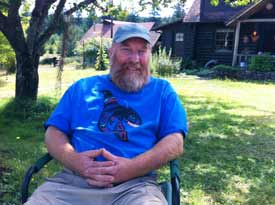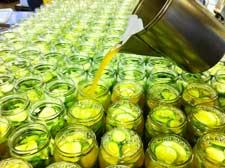Paul Fuller and his wife Judy have been building their food processing business—they refer to it as a “glassery” rather than a cannery—for 12 years. They started Sweet Creek Foods by processing pickles, then moved on to jams, tomatoes, salsa and tuna. But what they were really building, according to Paul, was an essential piece of a regional food system.
Fuller noticed that a huge amount of perfectly good, fresh produce from local farms was being tossed out because it had a small blemish or was not the right size. Knowing that wasted produce meant lost income for farmers, he sensed an opportunity to help the farmers as well as build a viable business for his family. With that goal in mind, he and Judy started producing fresh pack pickles, something they’d enjoyed doing for themselves for years.
It took a few batches to perfect their technique so that the pickles had the right amount of crispness, but they now produce 100% certified organic bread and butter pickles, garlic dills and chili dills. Using cider vinegar rather than the standard distilled vinegar, they fresh pack their pickles by brining them in cool salt water for 24 to 48 hours. The brined cucumbers are hand-packed in jars, pickling spices are added and then a hot vinegar brine is poured over them. This pickles them in the jar rather than using a fermentation process to do the pickling, which Fuller feels gives them a fresher flavor.
Besides processing their own line of products, Sweet Creek also offers a service called co-packing to farmers, giving them the opportunity to develop value-added products without the expense of having to build their own processing facilities.
“We do everything from applesauce, marinara sauce, green beans, pickled beets, jams, wine jams—anything they want that they have a recipe for,” Fuller said, calling it a new business paradigm.
“I want them to survive,” he said, and being able to sell processed items gives small farmers an additional revenue stream during peak season and one that can help carry them through the winter. He’s even developed a marketing package for farmers to use that helps them build a successful business plan for selling their products.
“I really want our business to feel right and I want it to be an example for people to do things,” he said. “We believe in relationship in what we do, and so relationship with farms and a relationship with the stores is important to us. We bring our morals and our philosophy into our business, not make it separate.”
Photos and text by Kathleen Bauer
Most of the videos featured on Cooking Up a Story were produced, filmed, and edited by Rebecca Gerendasy. Fred Gerendasy contributed as a writer to many of the posts and occasionally as the interviewer. Visit Rebecca Gerendasy Clay – Art and Fred Gerendasy Photography to see their current work.


